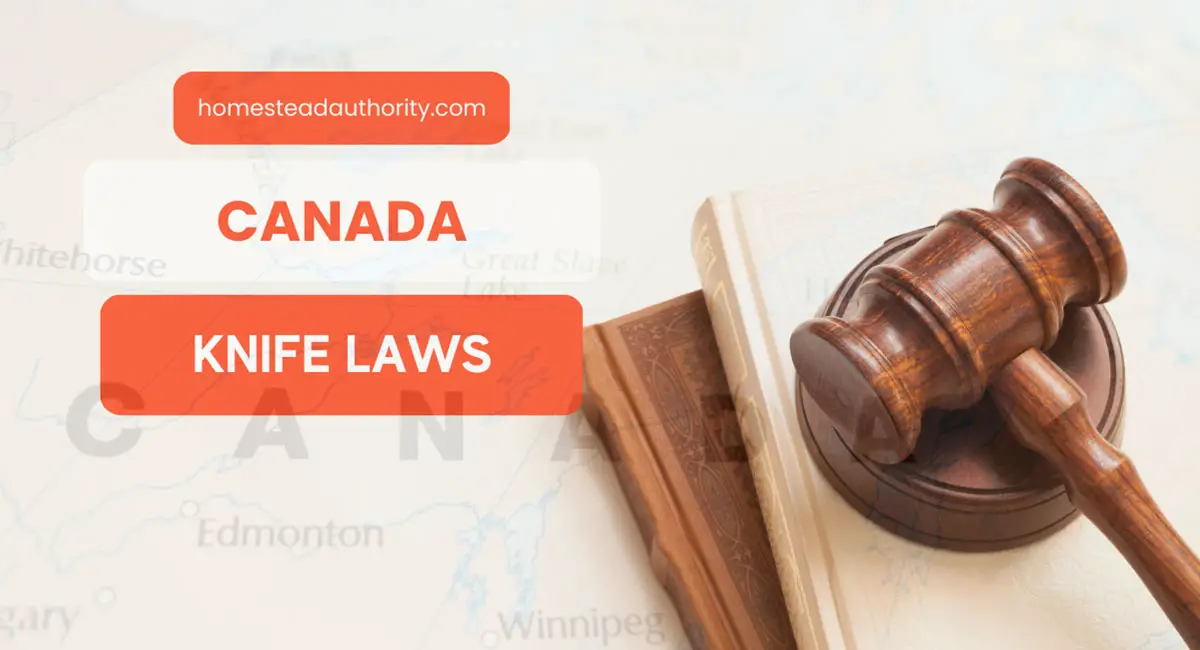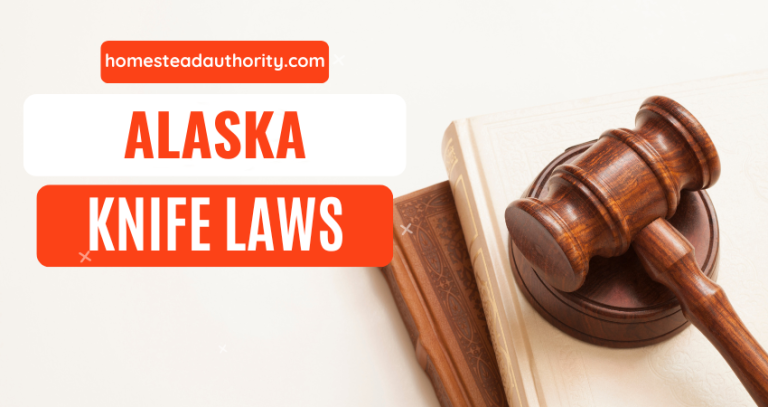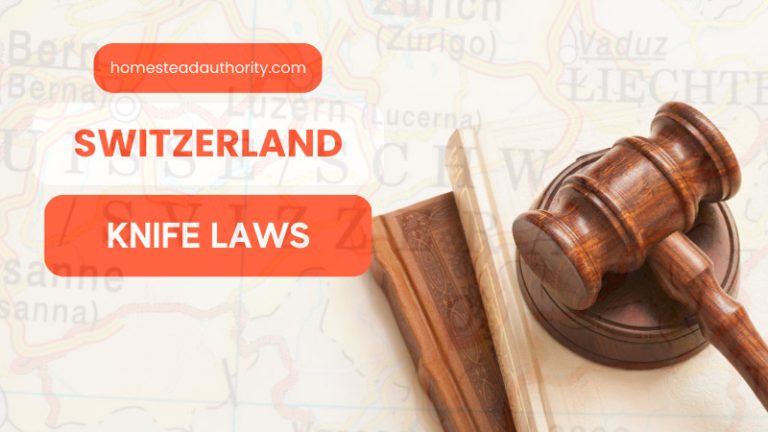Knife Laws in Canada: What Criminal Code States
Carrying or possessing knives in Canada is illegal if it counts as a prohibited weapon. You can only carry a handful of knives legally under certain conditions.
Even if you carry a legal knife for self-defense, it is illegal in Canada. Among the 788 homicides reported in 2021, the knife was the weapon of crime in 242 incidents.
Section 84(1) of the Canadian Criminal Code states that a knife is prohibited if the blade opens automatically. Whether the blade opens by gravity or centrifugal force, it will be a prohibited weapon. Even if the knife has a spring mechanism with buttons on the handle, it will be illegal to possess or carry the knife.
Canada knife laws have various use and possession offenses that Canadian citizens should know about. But the statutes are too complex to understand for all citizens.
We simplified the statutes and tried to give you a clear idea of the law. Let’s get started.
Highlights
Before going into the nitty gritty of knife laws in Canada, here is a quick look at the key points. Check them out.
- Statewide Preemption: No
- Concealed Carry: Carrying concealed weapons that are prohibited is illegal in Canada, as mentioned in Section 90(1) of the Criminal Code.
- Schools or Public Meeting Area: There isn’t anything explicitly mentioned about carrying a knife in a school area. But in general, possessing or carrying a prohibited weapon in a public meeting area is illegal.
- Critical Dimensions: There is nothing as a legal knife length limit in Canada. So, the illegality of the knife doesn’t depend on its blade length.
- Punishments: Unlawfully carrying or possessing knives in Canada can cause imprisonment from five to ten years, depending on the type of violation.
List of Illegal Knives in Canada
As mentioned in Section 2 of the Criminal Code, a weapon means an object that aligns with three factors. If it is used to cause death or injury to any person and threaten or intimidate any person, it will be a weapon.
If the object is designed or intended for any of the above activities, it will also count as a weapon. Here is a list of prohibited weapons in Canada.
- Automatic knives
- Centrifugal and gravity knives
- Finger rings with sharp objects
- Devices with concealed knife blades
- Spiked wristbands or knuckles
- Belt buckles with concealed blades
- Nunchaku or shurikens
- Push daggers
Remember, any other device or object can also fall under this category if they are defined as a prohibited weapon under the law.
Illegality of Knives Based on Different Factors
Regardless of the knife type and size, possessing or carrying knives can be illegal based on the following factors.
A. Illegality in certain areas
Though no specific areas are mentioned where the possession or carrying of knives is illegal, you can’t carry a prohibited weapon in a public meeting. Section 89(1) of the Criminal Code prohibits carrying weapons while attending or going to a public meeting.
B. Illegality in local/state governments
There is no specific statute regarding the illegality of knives in local/static governments. Other statutes regarding the possession or carrying of knives will also be applied here.
C. Illegality based on concealed and open knives
Carrying concealed weapons is illegal, as mentioned in Section 90(1) of the criminal code. Open carrying is also illegal if the knife falls under the prohibited weapons category.
D. Illegality of carrying, possession, selling, manufacturing, importing, trading
Sections 99(1), 100(1), 101(1), 103(1), and 104(1) say trafficking weapons, possessing weapons for trafficking, importing, or exporting weapons is illegal.
E. Illegality to the degree of significance, such as the impact on interstate commerce
There is no specific statute regarding the illegality of knives depending on the impact on interstate commerce.
Penalties and Punishments for Carrying Illegal Knives
Violating knife laws can send you to jail for five to ten years, based on the type of violation. Here are some general punishments for violating the law.
- If you are convicted of carrying a concealed weapon, you can face imprisonment for a maximum of five years.
- For possessing weapons with the intent to cause danger, the convicted individual can face imprisonment for a maximum of ten years.
Exceptions in the Knife Law in Canada
Section 96(3) states the exceptions where an individual will not be guilty of possessing or carrying prohibited weapons.
Can You Carry a Knife in a Car in Canada?
As mentioned in Section 94(1), you can’t carry a knife in car in Canada unless you have authorization or a license to transport the weapon. You can face up to ten years of imprisonment for violating this law.
Exemptions in the Knife Law of Canada
Section 117.07 has the list of exempted persons by the law. Peace officers, members of the Canadian Forces or visiting forces, employees of the federal public administration, and other officials mentioned in the law are exempted.
List of Legal Knives in Canada
As possessing or carrying most knives is illegal in Canada, you can carry only a few knives as necessary tools. Here is a list of those knives.
- Fixed blade knives with proper sheathing
- Multi-tools
- Thumb stud knives
Remember, the intent of carrying a knife is always important in Canada. So, if you carry a knife somewhere you don’t need, you can still be guilty of a knife law violation.
Knife Lawsuits in Canada
An interesting case can be the lawsuit of Gurbaj Sing, where the Sikh boy was prohibited from wearing a kirpan in the classroom. It is a kind of ceremonial dagger, required by the faith of Sikhs.
In May 2002, the Superior Court of Quebec ruled that it isn’t a weapon for violence and can be worn with proper sheathing.
Knife Length Limit in Canada
The laws regarding possessing or carrying weapons don’t state anything related to what size knife is legal to carry in Canada. If a knife is considered a prohibited weapon, you can’t carry it, no matter the blade length.
When necessary, you can possess knives of any length that aren’t prohibited. For example, you might use a long chef’s knife while camping somewhere.
Conclusion
Canada knife laws have multiple statutes regarding the definition and prohibition of carrying or possessing knives. Many of the sections are interrelated, so finding the exact meaning of the law can be difficult for most citizens.
As the knife laws in Canada are a lot stricter than in other countries, USA and Australia, for example, you should have a clear idea of the law.
We extracted the key regulations from the knife laws. So, you can be aware of the violations before carrying or possessing a knife of any description.



![Understand Hawaii Knife Laws In 10 Minutes [Everything You Need To Know]](https://homesteadauthority.com/wp-content/uploads/2022/10/Hawaii-768x407.png)



